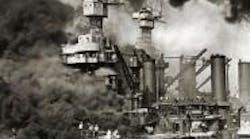“We shall not flag nor fail. We shall go on to the end.” –Winston Churchill
There have been many dark times in American history (including the one of which we’re living through right now) when we as a nation stood horrified amid carnage and wreckage, surrounded by chaos and failure, wondering if indeed the proverbial final ending had come round at last.
December 7th of course was one such tragic day – a day when war finally came and engulfed America. In short order, following the surprise attack against the U.S. Navy base at Pearl Harbor, we were officially at war not just with Japan but Nazi Germany as well, for Adolf Hitler declared war on the U.S.A. even before the smoke of battle fully cleared from around Oahu.
The tragedy at Pearl Harbor that day 69 years ago is of course amplified by the many failures on the part of the U.S. to realize the imminence of a Japanese attack. We were not only surprised in Hawaii, either, for Japanese Naval and Army forces destroyed American outposts such as at Wake Island and invaded the Philippines. Eventually, the U.S. would be routed entirely from the Pacific.
Intelligence experts who had broken the Japanese code didn’t figure it all out in time; ships and planes at Pearl Harbor and in the Philippines were parked in tight groups for fear of sabotage, making them sitting ducks for an airstrike. Finally, at Pearl Harbor, U.S. military personnel were on relaxed Sunday status as Japanese warplanes began to deliver death and destruction from the crystal blue sky above.
Thus there is no doubt that the success of the December 7th attack on Pearl Harbor – and what followed throughout the Pacific theatre – rested in no small part on widespread American failures. Yet that is only part of the story; and the part that matters the least in some ways.
What Americans (and truckers in particular) should focus on is what came after that terrible day in December nearly seven decades ago.
America did not sue for peace, as the Japanese expected. Much like the British, facing Nazi Germany alone after the fall of France a year earlier (and before Hitler had turned his devilish ferocity upon his erstwhile ally Josef Stalin), the U.S. began fighting a slow, hard, terrible road back across the Pacific (and Europe for that matter).
Doing all that fighting (and dying) fell to a generation of Americans who had suffered through cataclysmic economic hardships, who hadn’t been steeped in fanaticism and war like their Japanese and German counterparts, yet who never quit despite the ferocity and losses they faced.
Guadalcanal was once such touch-and-go battle fought a year after Pearl Harbor – a living hell for the U.S. Marines who fought there, malnourished, sick with jungle-borne maladies, and almost always outgunned.
Yet they won -- and continued on, facing ever more terrible conflicts at places such as Tarawa, Iwo Jima, and Okinawa, until finally resorting to nuclear weapons to get the Japanese to surrender.
America’s first sally against Germany came in North Africa, where they went toe-to-toe with the brilliant General Erwin Rommel and his dreaded Afrika Korps, which brutally savaged them at the Kasserine Pass.
Yet Americans picked themselves back up and returned to battle Rommel’s forces, eventually driving the Germans out of North Africa alonside their valiant British and Free French comrades. In time – again, despite disastrous setbacks – American soldiers and their allies would tortuously retake Italy, then France, and finally conquer Germany.
It’s highly likely that none of that story – so clear now as we look back upon it – even seemed remotely possible to the men and women who lived through December 7th.
They could only see the enormity of the challenge before them – war in two hemispheres, against two fanatical enemies armed to the teeth and covered with victories.
Yet they dug in, on the battle lines and in the factories, and went forward despite the painful sting of recent failures and of the potential of more to come -- staying the course until the war stood won.
Indeed, it is that spirit we honor today – a spirit we share, that we entrust shall carry us forward through our own dark times (mild though they may be by comparison) into what Winston Churchill once called “broad sunlight uplands” of our future.





